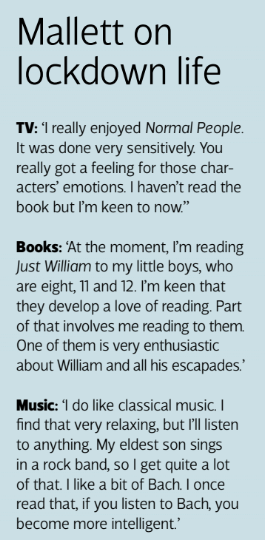ITN Chief Executive Anna Mallett tells Steve Clarke that her doctorate is less relevant than her people skills.
Anna Mallett, CEO of ITN for the past 12 months, could be forgiven for looking a little wearied. Even before coronavirus struck, the news organisation was working full tilt, covering such seismic events as Brexit, the Conservative Party leadership contest and a particularly fractious pre-Christmas general election. And now this.
But Mallett, a former BBC executive who began her TV career researching Channel 4’s The Big Breakfast’s knobs and knockers item – it was a holiday job – positively radiates energy during our 45-minute Microsoft Teams interview.
This is perhaps just as well. In common with most of ITN’s peers, the company is operating with around a third fewer staff, owing to social-distancing rules and employees home isolating. Of course, audiences for ITN’s daily news programmes – for ITV, Channel 4 and Channel 5 – have soared as the UK turns to trusted sources of information during the pandemic.
Success of this kind must be a tonic to any boss, especially to one relatively new to the job. She was appointed as John Hardie’s successor in December 2018, the first woman to run Britain’s biggest commercial news provider. She started work the following April.
Hardie had successfully diversified ITN’s business, boosting its production activities to embrace sport, TV commercials and factual programmes for a range of broadcasters, including the BBC, Channel 5 and Netflix.
Mallett recently announced rising revenues at ITN Productions: in 2019, they jumped 20% to a record £18.2m, after producing some 664 hours of content, including the award-winning Channel 4/ITN Productions documentary for Channel 4 and PBS Frontline, For Sama. Crucially, new long-term news contracts have been secured with ITV and Channel 5; the latter has also extended its deal for ITN to make the daily Jeremy Vine show. ITN’s news-supply arrangements with ITV, Channel 4 and Channel 5 account for two-thirds of the company’s revenue.
And if ITN didn’t outperform the BBC at February’s RTS Television Journalism Awards, few would deny the excellence of much of its recent output, whether on ITV during last year’s general election or on Channel 4, with its coverage of Brexit and now the pandemic in its extended bulletins.

“It’s that range and dynamism that makes ITN unique,” says Mallett. “We’re creating content every day. In this building we have three different news services, serving three different audiences.”
She adds: “I’ve always loved TV and working in content and been enthusiastic about storytelling.” A Durham University geography graduate – she did her doctorate at Oxford on John Martin, the 19th-century landscape painter and engineer – her first full-time job was working for the Boston Consulting Group, where she stayed for seven years and specialised in media and retail.
“If you’re interested in understanding business, that’s a great place to start your career.... It’s important to be logical, thoughtful and analytic, as well as having the right kind of emotional intelligence.” Spotting her obvious leadership qualities, Boston sent her to Harvard Business School.
At the BBC, where she worked for 13 years, her reputation was that of a caring boss. She began her BBC career in 2006 as a strategist, initially working on an attachment in news. There, she assessed which stories might work best in a BBC One 10:00pm slot. At the time, a row was raging because the Director-General, Greg Dyke, had decided to move the BBC Nine O’Clock News to go head-to-head with ITN’s News at Ten.
Subsequently, Mallett landed a permanent job in the BBC’s strategy team during the Mark Thompson era. “The benefit of working in strategy is that you do see the wood from the trees and, quite quickly, begin to understand some of the big issues. You also get to meet a lot of different people across the BBC.”
Her career at the national broadcaster included a period as controller of business strategy, where she was responsible for the BBC’s overall commercial strategy, as CEO of the commercial facilities operation, BBC Studios and Post Production (now BBC Studioworks) and, latterly, COO at BBC Studios, setting up the production giant with Mark Linsey, a seminal moment for the Beeb.
“I think that was the biggest change the BBC has ever made,” she recalls. “That kind of transformational change really excited me. The world’s changing – you’ve got to be agile, you’ve got to adapt. It was great to be part of that, although not always straightforward. Understandably, change brings a lot of concern and there was a lot to work through.”
“People really want that trusted news but at all times it’s our responsibility to protect our teams"
It sounds like valuable experience for running ITN during such challenging times. She describes her strategy at ITN as: protecting the core business – the contracts with ITV, Channel 4 and Channel 5 – while growing the production business, where innovation is key – “Our advertising division created the world’s first live ad that utilised 5G” – and delivering big events “brilliantly”. “We had a few of those last year, including the Tory leadership debates and the general election,” she says. “That’s where ITN comes into its own. We need to make those big events count.”
Her skills as a lobbyist shouldn’t be underestimated, either. In a recent submission to the House of Lords Communications and Digital Committee’s inquiry into the future of journalism, ITN stressed that “high-quality, regulated, impartial provision from multiple sources is essential to a pluralistic news environment in delivering choice and alternative viewpoints that form part of our democratic process, and this should be protected at all costs”.
“As we face a global pandemic, this review could not be more urgent,” says Mallett. “All our news programmes are seeing sharp increases in viewing figures as people seek out reliable, trustworthy information.
‘That audiences are turning to the established, professional sources of journalism at times of crisis serves to underline their enormous value to society and underscores a need for action to protect the public service broadcasters and quality journalism in the future.”
As a response to the impact of the health emergency, Mallett has put in place a series of cost-saving measures, including a recruitment freeze, targeted restructuring and furloughing staff.
What, then, is her biggest challenge as ITN continues to navigate and report on the crisis? “Ensuring you keep your services on air and keeping your team safe. That is the constant challenge.
“Things change all the time, so, for example, with the recent relaxation in lockdown, more people will be out and about. Do we need to change anything?
“People really want that trusted news but at all times it’s our responsibility to protect our teams, whether they’re going into difficult situations, such as ICU units, or travelling into and being at work.”




